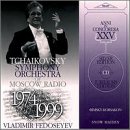| All Artists: Rimsky-Korsakov, Fedoseyev Title: Snow Maiden Members Wishing: 1 Total Copies: 0 Label: Relief Release Date: 6/27/2000 Genre: Classical Style: Opera & Classical Vocal Number of Discs: 3 SwapaCD Credits: 3 UPCs: 034062404926, 7619934914920 |
Search - Rimsky-Korsakov, Fedoseyev :: Snow Maiden
 | Rimsky-Korsakov, Fedoseyev Snow Maiden Genre: Classical
|
Larger Image |
CD Details |
CD ReviewsA very welcoming re-ssue of Rimsky-Korsakov's masterpiece! David A. Hollingsworth | Washington, DC USA | 09/15/2000 (5 out of 5 stars) "Piotr Illyich Tchaikovsky was rather vexed once Rimsky-Korsakov came up with the operatic treatment to "Snegoruchka" (the Snow Maiden) after a play of Alexander Ostrovsky. Tchaikovsky had written an incidental score to the play by 1873 and it scored a huge success. But Rimsky-Korsakov opera "Snegoruchka" of 1881 (which was his third) scored even a bigger success at the 1885 premiere, performed by the Mamontov Opera Company in Moscow (which explains Tchaikovsky's reaction). But, Ironically, it was Tchaikovsky's incidental score that would eventually give Ostrovsky's "Snegoruchka" a permanent place in the world of literature. And that to me remains a puzzlement, for Rimsky-Korsakov's score is wholly attractive and colorful, rich in his usual inventiveness of the choral folklore scenes. This is especially true in the beginning scene of Act II where the blind Psalterists was singing in glorification of Tsar Berendey. Where the Dance of the Tumblers is an orchestral showpiece (quite often performed), the opera is one of the best lyrical work ever to appear, and Fedoseyev, Svetlanov, et al. were right not to put it on back seat of oblivion. The story is heartwarming in its' own right. The Snow Maiden, the daughter of Frost and Spring, left her solitude to seek companionship of mortals, against her parents' warning (prologue). She is a supernatural being and therefore, she can only live as long as her heart is not warmed by mortal love. She fell in love with Lel, a shepard, whose songs she heard & deeply admired, but Lel is in love with Kupava. But Kupava was marrying Mizgir, a tartar, and it was during their wedding that Snegoruchka fell in love with Mizgir (and Mizgir fell in love with her & therefore left Kupava). Kupava was outraged & asked Tsar Berendey for protection (Act I). The Tsar was displeased & order Mizgir banished. But, after seeing Snegoruchka, the Tsar announced that if Mizgir can make Snegoruchka fall in love with him before dawn, he shall have her hand in marriage. Mizgir asked for his banishment to be postponed & vowed to win her heart (Act II). But Snegoruchka's passion towards him grew and by the vagaries of the Cupid, returns to her mother who gave her the power of human love (Act III). Eventually, it was the love and the sensibility towards Mizgir that made her prey to the sun god Yarillo. The sun descended upon her and she floats to Heaven in vapor while Lel and the people involve sing a hymn in praise of the Sun (Act IV). The performance by Vladimir Fedoseyev & the USSR Radio and Television Symphony Orchestra and Chorus were altogether sumptuous. Nothing bland or overheated is observable here and the performance captured the magic behind this delicious score. The singing is likewise sumptuous from all members of the cast. Irina Arkhipova brought out the warmth of both the Spring Fairy and Lel (why she played the role of Lel I'm uncertain) while Lidya Sakharenko as Kupava was as natural as Arkhipova's. Alexander Vedernikov, at a height of his career, brings out the paternal role of King Frost affectively and freshly, with no strain on his voice. Anatoly Moksyakov as Mizgir and Anton Grigoryev as Tsar Berendey were commanding throughout. The Relief CD reissue from the original Melodiya/EMI LP recording also capture the magic behind the work. It is beautifully atmospheric, spacious, and natural (which is hardly an improvement over the orginal LP recording-also very well done). A well blended recording even, in some respects, overshadows a rather disappointing packaging of Relief. The cast listing is complimentary, but the synopsis is too brief. The libretto is only in cyrillic and has no translations while the biographical section is far from complete (it omits among others, Vedernikov, one of the most legendary bass singers in Soviet Russia & abroad). But, definitely, it's a CD album worth having & even worth playing alongside Tchaikovsky's incidental score. Dare I hope for Relief to re-issue Rimsky-Korsakov's "Mlada" performed by Svetlanov and the Bolshoi or Shebalin's "The Taming of the Shrew"?" Glorious Rimsky V. Stasov | 05/03/2009 (5 out of 5 stars) "Snow Maiden, or Snegurochka, is another of Fedoseyev's great Russian opera releases on the Relief label, along with Rimsky's May Night and Tchaikovsky's The Slippers. Ideal singing, conducting and sound quality make this trio among some of the finest recordings of Russian operas ever preserved for public consumption. Unfortunately, they are almost impossible to locate, and suffer from unavailable translations of their librettos.
If you're motivated enough, and already have a love for the vast treasures offered by Russian national operas, I recommend searching for these recordings, and Svetlanov's version of Snow Maiden, which features Vishnevskaya and Kozlovsky. The music is melodious and the orchestration is rich. With a little effort, you can track down the librettos. I had to find some of these operas on LP in order to obtain the librettos, but it was worth the effort. In the case of The Slippers, I purchased Rozhdestvensky's recording, which can't compare to Fedoseyev's. But it came with a libretto. I understand expense and time can prevent one from acquiring these jewels from the Russian repertoire. But for those who understand the ecstasy that lies in the world of Russian opera, I highly recommend these four recordings." |

 Track Listings (19) - Disc #1
Track Listings (19) - Disc #1